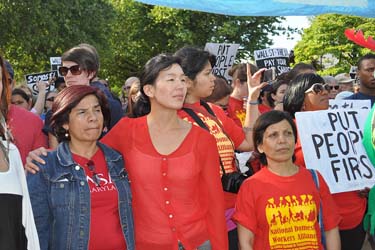Refocusing Our Lens: Domestic Workers’ Rights Are a Neglected Feminist Issue
Feminists need to pay more attention to domestic workers' rights, especially in light of how hard domestic workers toil not just in their jobs, but also to advocate for their own basic workplace protections.

Dissent magazine’s winter 2013 series “The New Feminism” is jaw-droppingly smart and relevant, and most importantly, it gives pop-feminism a good shake. Specifically, Sarah Jaffe’s article “Trickle Down Feminism” provides the most powerful examples of how most feminists’ (including feminist writers’) energy has been misplaced, devoting countless articles to dissecting the every move of bright-shiny-wealthy superwomen like Yahoo CEO Marissa Mayer instead of the economic trends that impact so many more women’s lives.
Especially important, Jaffe discusses the socio-economic status of domestic workers, a topic Rewire has made a priority in our coverage over the past several months. The vast majority of domestic workers—nannies, home health aides and housekeepers— are women, and many are not earning a minimum wage. There is a powerful national movement to improve their working conditions and put basic labor protections in place, but stories about domestic workers are just beginning to truly receive their due in feminist and labor conversations and, because of people like Melissa Harris-Perry, on cable networks too.
The attention gap for this issue is particularly unfortunate in light of how hard domestic workers are toiling not just in their jobs, but also to advocate for themselves. The successful campaign for a New York Domestic Workers’ Bill of Rights which passed in 2010, and the campaign in California which unfortunately died with the Governor’s veto, were fueled by domestic workers who organized and traveled to their state capitols to tell their stories.
And in Massachusetts, where a campaign for domestic workers rights is about to launch and will focus on better wages, benefits, the right to rest breaks, and protection from sexual harassment, one of the key leaders of the Massachusetts effort is a woman who spent much of her life as a domestic worker, Maria Natalicia Rocha-Tracy (Natalicia Tracy). Tracy is currently Executive Director of the Brazilian Immigrant Center in Boston and a Boston University Ph.D candidate in sociology.
Tracy moved to the United States as a teenager to pursue college. She settled in West Roxbury and Brookline, MA at the age of 17 and accepted work as a nanny and elder caregiver to support herself. In her first job as a nanny, Tracy had a two-year contract and she was told she would be part of the family.
In the bait-and-switch that many domestic workers experience, Tracy’s reality was far from warm and welcoming. She found herself working 80-90 hours per week, living on her employer’s porch in the cold. She didn’t have right to call home, couldn’t receive letters, and spoke little English. She was paid $25 per week.
“When I look back sometimes it is hard to believe I was able to get out of that situation,” Tracy said. “I was all alone.”
When she looked for her next job, Tracy made sure she would have a real room of her own and time to go to school. “It’s like a movie sometimes when I think back to the things I had to go through. I didn’t understand rules and the laws.”
After struggling through this period of her life, earning her college degree and now as leader of the Brazilian Immigrant Center, Tracy has devoted her life to improving working conditions for other domestic workers.
“We have an obligation and responsibility to change things,” she said. “If you start with policy and educating the community, you can break through this chain of abuse and discrimination.”
The Massachusetts campaign is inspired in part by New York’s successful campaign. Though California’s campaign ultimately ended in defeat, both states’ efforts are helping to inform the work in Massachusetts. The Massachusetts bill will be introduced later this month.
Tracy is working alongside many organizers including Monique Nguyen, Executive Director of Matahari, a group focused on ending exploitation of women, immigrants and workers. In her Dissent article, Jaffe points out that Gloria Steinem as well as National Domestic Workers’ Alliance leader Ai-jen Poo are among the key feminist voices in the movement—but simply, there needs to be more attention and advocacy from the rest of us.
